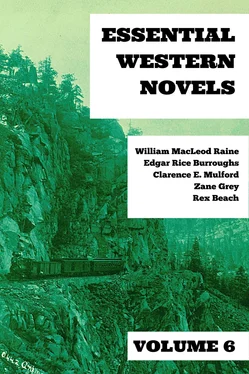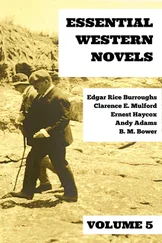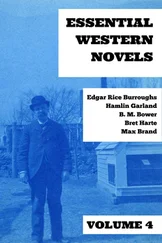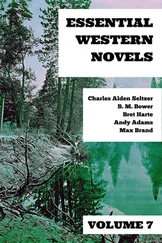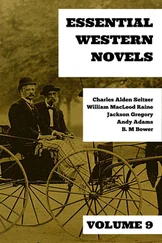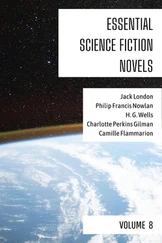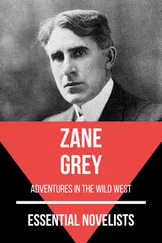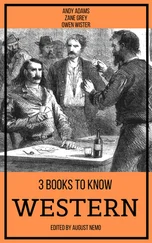He listened to the sounds of the cautiously propelled car, the clicks of the rail joints growing softer and softer. When they had died out, he walked swiftly back to the house, where he got his hat and coat and then went on to town. Going to where the roan patiently waited for him he led it to John Graves' stable and reconnoitered the building. John was not at home on this night of excitement.
Tex forced the door, and quietly saddled the sorrel and the gray, threw a sack of corn across the latter and, leading them forth, led the three animals back of a deserted building and then went toward the hotel.
––––––––

THE FALSE TRAIL AND THE TRUE
The maudlin crowd was ugly and did not accept the marshal's appearance with any enthusiasm. While he had not opposed them he had warned and sent away their hoped-for victims. Frank scowls met him wherever he looked. He stopped at the table where Gus Williams and a dozen cronies, the bolder men of the town, were drinking and arguing.
"Blascom's cussed sick," he announced. "Sick as a dog. I rode out to spend th' night with him, knowin' that when that coyote section-boss sent his pack out of town there wouldn't be no reason for me to stay here an' make myself unpopular. I got a good job in this town, an' I've got a right to have friends here. Anyhow, I told Murphy that if his men came back they'd have to do their own fightin'. Reckon that's why he sent 'em along. Him an' Costigan follered 'em on th' other hand car." He glanced over the room. "Where's Hennery?" he asked. "I heard he wanted to see me."
Williams roused himself and looked up through bloodshot eyes. "Th' fool's gone courtin', I reckon; an' on a night like this, when I needed him. Don't know when he'll git back. He mus' be enjoyin' hisself, anyhow."
John Graves chuckled and endorsed the sentiment.
Tex nodded. "I reckon mebby he is, his star bein' bright tonight. Much excitement in town after I left? Station agent make any trouble?"
"A lot of chances he'd 'a' had to make any of us any trouble," sneered a miner. "I reckon he cut an' run right quick. We've been figgerin' he's better off in some other town. Been thinkin' of chasin' him out. Any objections from th' marshal of Windsor?"
"Not a cussed one," answered Tex. "He's a trouble-maker, stayin' here. Chuck him on th' train tomorrow an' send him back East, where he come from. An' his sister, too, if you want."
Williams shook his head. "Not her," he said. "Henry'll never let her git away from him. He's aimin' to take care of her; an' he shore can handle her, he can."
"I reckon he can," agreed Tex. "I just come in to get th' doc to go out an' look at Blascom. Since he's struck it rich he's been feedin' like a fool. Them as live by canned grub, dies by canned grub, says I; an' he's close to doin' it. I got a bottle of whiskey for him, but I reckon gin will be better for his stummick. Yes, a lot better. Hey, Baldy!" he shouted. "Put me out a bottle of gin an' set up th' drinks for all hands. We'll drink to a better understandin' an' to Hennery an' his bride." He pulled the pint flask from his pocket and winked at his companions. "I got a little somethin' extra, here. Th' smoke of Scotch fires is in it. Might as well use it up," and he quickly filled the glasses on the table, discovering when too late that he had none left for himself. "Oh, well; whiskey is whiskey, to me. I'll take some of Baldy's with th' boys," and he swaggered over to the bar, tossing a gold piece on the counter.
"Where's yore badge, Marshal?" asked Baldy, curiously.
Tex quickly felt of his coat lapel and then of his vest. "Cuss it!" he growled. "I knowed I'd lose that star—th' pin was a little short to go far enough in th' socket. Oh, well," he laughed, holding up his glass, "everyone knows me now; an' they'll know me better as time goes on. Here's to Hennery!" he shouted. "Drink her standin'!"
The toast drunk to roaring jests, he took the gin and went back to Williams. "Goin' after th' doc," he remarked. "Lost my badge, too; but lemme say that anybody found wearin' it shore will have bad luck. See you all tomorrow. He's sick as a pup, Blascom is. Good night, an' sleep tight, as th' sayin' is!" he shouted laughingly and nodding at the crowd he wheeled and went out. Once secure from observation of any curious inhabitants of the town, he ran to the horses, mounted, and rode up to the Saunders' house, a home no longer. Entering it he quickly collected a bag of provisions and then, milling the horses before the door to start a plain trail, he cantered toward the station, where he crossed the tracks and struck south for the old cattle trail.
All night he rode hard, sitting the sorrel to keep his own horse fresh, and at dawn, giving them a ration of corn each, he ate a cold and hurried breakfast and soon was on his way again. During the forenoon he let the sorrel go, riding the gray with the depleted corn sack tied to the pommel. Several hours later he threw the still further depleted sack on the roan, changed horses again and turned the gray loose. After nightfall he came within sight of the lights of a small town and, waiting until the hour was quite late, rode through it casually to lose the tracks of his horse among the countless prints on its streets. He left it along a well-traveled trail leading westward, one which would take him, eventually, to Rawlins.
In the town of Gunsight, Dave Green was polishing glasses behind his bar when a dusty, but smiling, stranger rode up to the door and called out. Grumbling, Dave waddled forth to answer the summons.
"Which way to th' SV?" asked the stranger. "I'm lookin' for my friend Nelson."
"What is it—a house-raisin' or a christenin'?" asked Dave, grinning broadly. "Th' SV's gettin right pop'lar these days—as it ought to be." Dave cogitated a moment. This man said Nelson was a friend of his; but if not, there would be no harm done to anyone on the SV. Dave was quite certain of that, with Hopalong, Red, and the outfit at Johnny's back. Still, his curiosity was aroused. "Yore name Jones, or Ewalt?" he asked.
"Ewalt," replied Tex, grinning.
Dave left the door and gravely held out his hand. "Heard tell about you, long ago," he said. "We're good friends till you horn into a poker game that I'm settin' in. Heard about you this mornin', too. A tenderfoot, a cowpunch, an' a reg'lar picture in skirts stopped an' asked me what you did. Also wanted to know if I had seen Jones or Ewalt. You just foller that Juniper trail," and he gave a description tiresome, and needlessly detailed, to a man to whom compass points would have sufficed. "Jones comin', too? Don't know I ever heard of him."
"Jones is dead," said Tex with touching sorrow. "Th' pore ol' soul, we'll never see him more. He had buttons runnin' up his back, an' buttons down before."
"Too bad," replied Dave, but he was suspicious of the other's grief. He shook his head. "Life shore is uncertain. You tell Johnny if he's havin' a party that I ain't too fat to ride that far, not if I'm invited. I ain't much on dancin', but I'll do my best."
Tex nodded, thanked him for his information and went on, gradually becoming lost in introspective musings.
"Omar," he muttered, shaking his head sadly, "I ain't got no right. I'm hard-boiled, an' I've reached purty low levels th' last twenty years. There ain't no human meanness, no human weaknesses, hardly, that I ain't seen. My view of life is so cynical that it near scares me, now. I lost my illusions years ago, an' I'm allus lookin' for th' basest motives for a man's actions. Besides, I'm forty-odd years old—an' that's too old.
"Now you take Tommy Watkins. He's fresh, young, chock-a-block with illusions; trustin', ambitious, steady. He's clean, body an' mind. When he grows up, ten years from now, he'll be a purty fair sort of a young man. It shore does beat all, Omar."
Читать дальше
